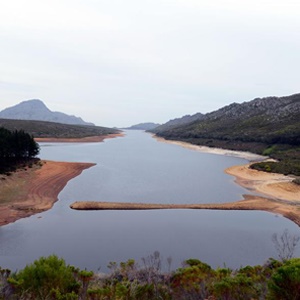
The water crisis in South Africa’s Western Cape is cause for grave concern. Authorities are desperately trying to find new water sources, due to consumption not reducing to sustainable targets. In Cape Town and surrounds, users are limited to 87 litres per user per day. Dam levels are hovering around 34%, with around 10% of that not usable. In 2016, the dams were at 60%, and a few years ago at 100% and over at the same time of the year.
A key challenge affecting water consumption behaviour is the time lag between consumption and the related bill and the resolution of the information on the bill. It is difficult to know if one is complying with the 87 litres per day, and if not, why not. This is because water meters are usually read once a month, with a bill for specific consumption, for example a bath, usually arriving only a month or two after that water flowed through the tap. There is also a large disjunction between the single action of drawing water and the cumulative bill that arrives. This further complicates linking consumption patterns to resulting costs.
This way of billing is not only a South African phenomenon. Internationally, even in the United Kingdom, many homes either do not have water meters at all, or rely on manual meter readings. But in South Africa, it’s obviously more cause for concern, given the water constraints and recent drought.
Smart metering has the potential to address these challenges. Smart metering leverages recent advances in wireless and electronic technology to remotely record and report metering. It is mostly used for electricity and gas billing. Since water is such a basic commodity, it’s provided at such a low cost, occasionally even for free that it does not usually make financial sense to invest in smart water metering technologies for billing purposes.
But at Stellenbosch University, we have developed a smart meter that measures and reports water use by the minute. The objective, however, was not to perform billing, but to create awareness and to help people conserve water. This can be done through understanding how consumption patterns relate to water volumes used. Our thought was that users equipped with easy to understand water consumption information in real time will save more. We believed that the lack of behavioural change in water consumption is mostly because of a lack of knowledge instead of refusal to change patterns or lack of incentives.
But there are challenges associated with the smart meters. Since smart meters are normally used for billing purposes, and in some instances used to shut off the supply in a prepaid setup, they are generally not well received. Another challenge is that the information provided tends to be technical and not easy to understand. To overcome these challenges we set out to develop a solution that makes the information easy to digest, and to demonstrably show the behavioural impact of presenting this information to a range of consumers.

A smart meter that measures and reports water use by the minute.Author supplied
Creating awareness
We recorded the time from when a tap opens to when it closes an “event.” The first step to creating awareness, was to relate these events to specific times of the day, which allows the user to quantify specific water actions.
For example, the meter would capture a 75 litre event at 07:15 lasting for 4 minutes. From these events, the meter generates a daily itemised billing-type list of events for every day. This then allows the user to identify large or unintended events during the day. By relating the amount used to a money value, the user can associate a cost with each action.
But we don’t only make this information digestible for the general person. We break it down even more to make it understandable for little children at a local primary school using playing cards with usage information.
In addition to the meters being used to create awareness, these meters are a powerful tool when it comes to identifying infrastructure problems. We have used smart water meters to find leaks, bursts and to identify open taps and running toilets. Through automated text message and email notifications, the relevant people can be made aware of abnormal water patterns in an instant, allowing rapid response and significant savings.

Results
We have installed just under 50 of these smart water meters in the last few months. The results have been surprisingly positive.
In once case study on campus, we managed to reduce the water consumption of a local coffee shop by 68% in one week by only making the consumption information available online to the owner. We have seen similar results at homes, with reductions in consumption ranging between 40% and 60%.
But the biggest impact we have seen has been at schools. Through initial awareness and a swift response, significant amounts water was saved. An average of 16 kilolitres per school per day is already being saved at three local schools, with more opportunities for improvement. The monthly savings at one primary school is the equivalent of two junior teachers’ salaries.
In addition to the daily savings, the smart meters showed excessive water flowing when pipes bursts or irrigation systems were activated. By acting on this information within minutes, one school was able to prevent losses of around 1 million litres of water through a burst pipe in the middle of the school holidays.
If the schools in the Western Cape save a realistic average of 10 kilolitres per day, in excess of 15 megalitres would be saved per day in the province. That would be 13% of the target reduction.
![]() A key question is then maybe not how smart metering can be used to catch the bad heavy consumers, but rather how smart metering can be used to help those who need to do so.
A key question is then maybe not how smart metering can be used to catch the bad heavy consumers, but rather how smart metering can be used to help those who need to do so.
- MJ (Thinus) Booysen is Associate Professor at the Electrical & Electronic Engineering Department at Stellenbosch University.
This article was originally published on The Conversation. Read the original article.




 Publications
Publications
 Partners
Partners























